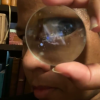There is this tiresome old trope in any science fiction that deals with ants, (or aliens that are stand-ins for ants or termites or bees or any other eusocial insect,) where the queen dies and then, suddenly none of the workers can function anymore.
The workers in this theory of what a "hive mind" is are all just automata that extend the body of the queen. This is, of course, totally backwards.
It's the death of human queens that leaves their subjects disoriented.
We misperceive the order and smooth functioning of eusocial colonies for authoritarianism. No society could function so well without a tyrant, a single central mind, we assume. A great man or woman who drives their history must exist.
This is all human mythology applied to the alien world of ants.
What happens when the queen dies? Well let me tell you, because I've seen it happen... sadly.
Queens are the longest lived members of ant colonies. So, naturally if you keep ants, you grow attached to the queen. And it's true that without her the colony has no future in the long run for most species of ants (there are exceptions, who can gain new queens, or who have multiple queens... but most ant colony have but one) So, when the queen dies it's sad.
But, when she dies the workers ... keep going. You see the advantage of a "hive mind" isn't that there is one central node doing all the thinking, no, the colony is a distributed organism. And when the queen dies it's like menopause for a human body. There will be no new children. (though all eggs and larvae alive when the queen dies will be raised fully.) The ants without a queen continue to care for each other, continue to grow their fungus gardens, or heard aphids, they keep storing seeds and feeding the young.
With time, the last of the eggs and brood are raised to be adults. The nest is cleaned and tidy, everyone is fed, with all these tasks done the ants huddle together to conserve energy. They will keep tending the nest and eating when they need to... possibly for years. Menopause isn't the end of an individual life, it's just the closing of a particular door.
I do think ant colonies like this, like my own queen-less colony can seem a little sad. Eggs and larvae and pupae are such joys for ants. They lavish food and attention on their little sisters. No more little sisters means a less active colony, it's like winter has set in permanently. But ants live through winters. Sometimes many winters.
If you give a colony in this state brood from another queen they will raise them with great excitement. But there is no peaceful way to move the workers to a colony with a living queen.
This situation happens rarely in the wild. There are so many other things that can kill a colony long before a queen lives so long that she dies of old age.
In the wild there are also parasitic species of ants that look for colonies without a queen, or with a queen that is weak and easy to kill. These sneaky queen ants will "steal" a colony. Though, from the perspective of ants without a queen, this is almost a mercy.
But, there is none of this... everyone falling over and dying or everyone going crazy you see in stories about hives. The queen is just one part of the colony... a critical part... but still only a part.
And each individual ant still has her own life to live.
Edited by futurebird, June 23 2022 - 11:12 PM.













